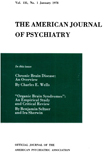Abstract
A questionnaire on alcoholism returned by members of the Southern California Psychiatric Society shows the following:
1. Almost half the respondents do not treat alcoholics. Almost half of those who do limit the number they treat. In approximate numbers, four-fifths treat 5 or fewer, a total of 55 alcoholics. Five-sixths had 10% or less alcoholics in practice.
2. The members show no enthusiasm over their therapeutic results. Over half have no recoveries whatever. Almost four-fifths of those with any success have 10% recovery or less.
3. An overwhelming majority of the respondents use psychological therapies in chronic alcoholism.
4. Three-quarters of the members are in private practice, the rest in hospitals and clinics. Treatment of alcoholics appears to be restricted almost entirely to hospital practice and a small group of private psychiatrists.
5. Almost two-fifths of psychiatrists do not know admission procedures to state hospitals, and three-fifths have never arranged admission. Two-fifths have had their patients refused admission to state hospitals. Over half consider admission procedures unsatisfactory. Over three-fifths approve of legal commitment for alcoholics, and three-fifths feel that treatment is helpful in committed patients.
6. Alcoholics Anonymous is approved by 99% of psychiatrists. Ninety-seven percent know their procedures, and 77% have referred patients to them. The results, however, they feel are only moderately good; that is, two-fifths remain abstinent for 1 year, one-fifth for 2 years, and one-tenth over 2 years. The respondents also feel that only half are well adjusted.
7. About two-fifths of the psychiatrists felt they had adequate facilities for private patients. Facilities for indigent patients are extremely meager. Three-tenths felt they had adequate hospital facilities, but just a handful felt they had adequate clinic or sanitarium facilities. Clinic and hospital facilities are most urgently needed.
8. Eighty-nine percent of psychiatrists are in favor of a clinic for alcoholics, and they feel that state, county, and community should support it.
9. Almost half feel that the Society should sponsor a clinic for alcoholics but both the assenters and dissenters agree on the role of the Society to the clinic, that is, advisory and consultative.
10. Thirty-five percent of the psychiatrists will contribute time to the clinic. Twenty-two percent will do this on a pay basis and 28% on a non-pay basis.
11. Almost half the psychiatrists felt that the clinic should be at the site of the greatest need. About one-fifth thought the clinic should be multiple and scattered in different communities, while the rest thought it should be most convenient to the psychiatrists.

